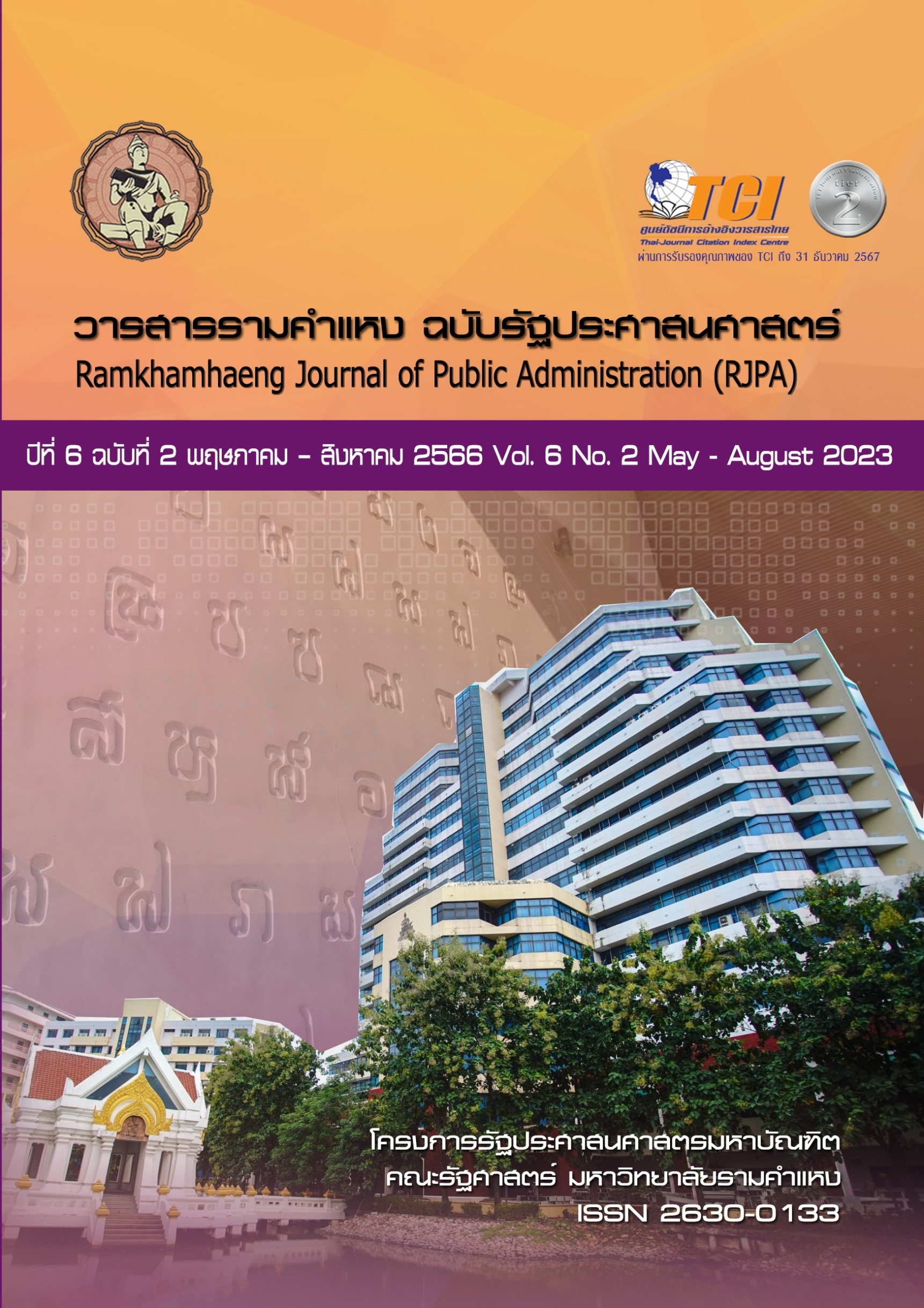กฎบัตรความช่วยเหลือเพื่อการพัฒนาอย่างเป็นทางการสู่กฎบัตรความร่วมมือเพื่อการพัฒนาของญี่ปุ่น
คำสำคัญ:
กฎบัตรความช่วยเหลือเพื่อการพัฒนาอย่างเป็นทางการของญี่ปุ่น, ความมั่นคงของมนุษย์, นโยบายการมีส่วนร่วมเชิงรุกเพื่อสันติภาพบทคัดย่อ
กฎบัตรความช่วยเหลือเพื่อการพัฒนาอย่างเป็นทางการของญี่ปุ่นเป็นแนวทางและเป็นข้อจำกัดในการดำเนินนโยบายต่างประเทศซึ่งเชื่อมโยงกับ อัตลักษณ์ประเทศรักสันติภาพ หลักการเหล่านั้น ได้แก่ การหลีกเลี่ยงการเกี่ยวข้องกับวัตถุประสงค์ทางการทหารหรือการซ้ำเติมความขัดแย้งระหว่างประเทศ รวมถึงการจับตาดูการนำเข้า-ส่งออกอาวุธและงบประมาณทางการทหารของประเทศผู้รับความช่วยเหลือ
บทความนี้จึงมีวัตถุประสงค์เพื่อศึกษาปัจจัยที่มีผลต่อการเปลี่ยนแปลงกฎบัตรความช่วยเหลือเพื่อการพัฒนาอย่างเป็นทางการของญี่ปุ่นในทศวรรษ 2000 ถึง 2010 เนื่องจากญี่ปุ่นพยายามรักษาสถานะผู้เผยแพร่บรรทัดฐานความมั่นคงของมนุษย์ในประชาคมระหว่างประเทศ อย่างไรก็ตามญี่ปุ่นได้เผชิญกับความท้าทายจากการเติบโตของจีนในด้านเศรษฐกิจและการทหารซึ่งส่งผลกระทบต่อระเบียบระหว่างประเทศและความมั่นคงของภูมิภาค ญี่ปุ่นจำเป็นต้องปรับเปลี่ยนแนวทางการดำเนินนโยบายต่างประเทศรวมถึงกฎบัตรความช่วยเหลือเพื่อการพัฒนาอย่างเป็นทางการเพื่อรักษาผลประโยชน์แห่งชาติและความมั่นคงของภูมิภาคภายใต้หลักการการหลีกเลี่ยงการทหาร
บทความนี้สามารถสรุปได้ว่าปัจจัยระหว่างประเทศและปัจจัยภายในประเทศ ได้แก่ บรรทัดฐานต่างประเทศและผลประโยชน์แห่งชาติของญี่ปุ่นซึ่งเปลี่ยนแปลงตามประเด็นปัญหา สถานการณ์แวดล้อม และทัศนะของผู้นำต่อภัยคุกคามมีผลต่อการเปลี่ยนแปลงกฎบัตรความช่วยเหลือเพื่อการพัฒนาอย่างเป็นทางการของญี่ปุ่น
เอกสารอ้างอิง
Arase, D. (2005). Introduction. In D. Arase (Ed.), Japan's Foreign Aid: Old continuities and new directions (pp. 1-19). London: Routledge.
Edström, B. (2003). Japan's foreign policy and human security. Japan Forum, 15(2), 209-225.
Er, L. P. (2013). The Fukuda Doctrine: Origins, ideas and praxis. In L. P. Er (Ed.), Japan's Relations with Southeast Asia: The Fukuda Doctrine and beyond (pp. 10-23). London: Routledge.
Garcia, Z. (2019a). China’s Military Modernization. In Z. Garcia (Ed.), China’s Military Modernization, Japan’s Normalization and the South China Sea Territorial Disputes (pp. 45-59). Cham, Switzerland: Springer International Publishing.
Garcia, Z. (2019b). Conclusion. In China’s Military Modernization, Japan’s Normalization and the South China Sea Territorial Disputes (pp. 109-124). Cham, Switzerland: Palgrave Pivot.
Garcia, Z. (2019c). Sino-Japanese Security Relations. In Z. Garcia (Ed.), China’s Military Modernization, Japan’s Normalization and the South China Sea Territorial Disputes (pp. 35-44). Cham, Switzerland: Springer International Publishing.
Kato, H. (2016). Japan's ODA 1954-2014: Changes and Continuities in a Central Instrument in Japan's Foreign Policy. In H. Kato, J. Page, & Y. Shimomura (Eds.), Japan's Development Assistance: Foreign Aid and the Post-2015 Agenda (pp. 1-16). London: Palgrave Macmillian.
Katsuhiro, S. (2007). Global Governance, Japan and the World Bank. In G. D. H. A. H. Dobson (Ed.), Global Governance and Japan: The institution architecture (pp. 110-125). New York: Taylor & Francis e-Library.
Koga, K. (2020). Japan's 'Indo-Pacific' question: countering China or shaping a new regional order? International Affairs,, 96(1), 49-73.
Kurusu, K. (2018). Japan as a norm entrepreneur for human security. In M. M. McCarthy (Ed.), Routledge Handbook of Japanese Foreign Policy (pp. 321-336). London: Rouledge.
Ministry of Foreign Affairs of Japan. (1994). History of Official Development Assistance. Japan's ODA Annual Report (Summary) 1994. Retrieved from https://www.mofa.go.jp/policy/oda/summary /1994/1.html#1
Ministry of Foreign Affairs of Japan. (1997). Japan's ODA Annual Report (Summary) 1997. Retrieved from https://www.mofa.go.jp/policy/oda/summary/1997/09.html
Ministry of Foreign Affairs of Japan. (1999). Official Development Assistance (ODA). Retrieved from
https://www.mofa.go.jp/policy/oda/summary/1999/ref1.html
Ministry of Foreign Affairs of Japan. (2003a). Japan's Official Development Assistance Charter. Retrieved from https://www.mofa.go.jp/policy/oda/reform/revision0308.pdf
Ministry of Foreign Affairs of Japan. (2003b). Summary of the 2002 White Paper on Official Development Assistance (ODA). Retrieved from https://www.mofa.go.jp/policy/oda/white/2002/summary.html
Ministry of Foreign Affairs of Japan. (2006). Towards Forming Friends of Human Security [Policy Speech]. Retrieved from https://www.mofa.go.jp/policy/human_secu/state0606.html
Ministry of Foreign Affairs of Japan. (2013). Japan-Philippines Summit Meeting. Retrieved from
https://www.mofa.go.jp/region/page6e_000121.html
Ministry of Foreign Affairs of Japan. (2015a). Cabinet Decision on the Development Cooperation Charter. Retrieved from https://www.mofa.go.jp/files/000067701.pdf
Ministry of Foreign Affairs of Japan. (2015b). Japan's Development Cooperation in the Years Ahead For peace, prosperity and a better future for everyone. Retrieved from https://www.mofa.go.jp/ files/000107850.pdf
Ministry of Foreign Affairs of Japan. (2016). Japan's Foreign Policy to Promote National and Worldwide Interests (Diplomatic Bluebook 2016). Retrieved from https://www.mofa.go.jp/files/000177721.pdf
Ministry of Foreign Affairs of Japan. (2019). Bilateral and Multilateral Security Cooperation. Japan's Security Policy. Retrieved from https://www.mofa.go.jp/fp/nsp/page1we_000085.html
Ministry of Foreign Affairs of Japan. (2022). Revision of Development Cooperation Charter (Direction of Revision) [Press release]. Retrieved from https://www.mofa.go.jp/files/100392002.pdf
National Security Council. (2014). Three Principles on Transfer of Defense Equipment and Technology. Japan's Security Policy. Retrieved from https://www.mofa.go.jp/files/000034953.pdf
Ohlin, G. (1968). The Organization for Economic Cooperation and Development. International Organization, Vol. 22(December 1), 231-243.
Oros, A. L. (2017). The New Conservative Mainstream and New Security Policies Under Prime Minister Shinzō Abe, 2012 to 2016. In D. C. K. a. V. D. Cha (Ed.), JAPAN’S SECURITY RENAISSANCE: New Policies and Politics for the Twenty-First Century (pp. 126-164). New York: Columbia University Press.
Satake, T. (2019). JAPAN’S “FREE AND OPEN INDO-PACIFIC STRATEGY” AND ITS IMPLICATION FOR ASEAN. Southeast Asian Affairs, 69-82.
Sayuri, S. (2007). Global governance, Japan and the International Monetary Fund. In G. D. H. a. H. Dobson (Ed.), Global Governance and Japan: The institution architecture (pp. 143-163). New York: Taylor & Francis e-Library.
Schweller, R. L. (1994). Bandwagoning for Profit: Bringing the Revisionist State Back In. International Security, 19(1), 72-107.
Suputtikun, T. (2012). An Excuse for Common goods: the multipurposeness of the "human security" concept in Japan's foreign policy. Asian Review, 25(Human security in Asia), 137-160.
Takayanagi, A. (2014). Japan's Ongoing Revision of the "ODA Charter": CSOs Opposing Securitization of ODA. OECD Reports, 246-251.
Toshiya, H. (2007). Global Governance, Japan and United Nations In G. D. H. a. H. Dobson (Ed.), Global Governance and Japan: The institutional architecture (pp. 215-231). New York: Taylor & Francis e-Library.
United Nations. (2020). United Nations releases special 2020 broadcast calling for collective action. Retrieved from https://www.un.org/sustainabledevelopment/blog/2020/09/united-nations-releases-special-2020-broadcast-calling-for-collective-action/
ดาวน์โหลด
เผยแพร่แล้ว
รูปแบบการอ้างอิง
ฉบับ
ประเภทบทความ
หมวดหมู่
สัญญาอนุญาต
ลิขสิทธิ์ (c) 2025 พิมพ์ชนก บุญมิ่ง

อนุญาตภายใต้เงื่อนไข Creative Commons Attribution-NonCommercial-NoDerivatives 4.0 International License.



